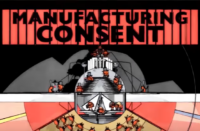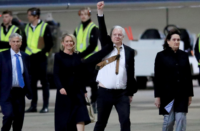So Fianna Fáil and the Blueshirts are now an item. Having recognised their obvious compatibility, they have agreed to move in together.
Talk of an end to Civil War politics is simply guff. Whatever ideological differences there were ended decades ago. Existing rivalry was competition between similar organisations. More Tesco vying with Supervalu for market share than Free Staters battling dedicated republicans.
Now in coalition, their priorities will remain unchanged. They will fight fiercely to maintain capitalism, with all its essential features, regardless of the cost to a majority of citizens.
Having suffered a fright at the general election, they will want to be seen addressing issues that alienated them from many voters. We recently had sight of the policy framework document agreed upon by the two parties’ TDs. It provides us with a master class in weaseldom. Ostensibly designed to deal with society’s difficulties, the draft is written in language affording the new coalition ample space for evasion, prevarication, and devious redirection.
What is meant, for example, by “acknowledging the importance of carers”—a round of applause in the Dáil, perhaps? How much creative ambiguity went into “working towards a consensus on a united island,” or “progress towards a living wage”?
One promise they will keep is to support further EU enlargement and integration. This will be, as Varadkar told RTE, to retain the confidence of the financial markets so that we can pay our debts. Bear in mind that the FG-FF axis intends to deal with the economic crisis by borrowing abroad rather than changing systemic failings. Needless to say, the intention is that the country’s citizens will bear the cost of borrowing.
All this is entirely predictable. Equally predictable is the response—or, more accurately, the endorsement—of the mainstream media and the establishment. Expect a sickening deluge of fatuous talk about political responsibility and of high-minded politicians demonstrating leadership in the national interest.
The severity of the economic downturn resulting from covid-19 will be greater than anything since the 1930s. Predictions of 20 per cent unemployment in the midst of a global depression will demand extraordinary measures by any standard. Amid hand-wringing and Churchillian rhetoric, we’ll be told that the coalition will be forced “reluctantly” to take “difficult” economic decisions. In a nutshell, it will be Austerity, here we go again.
Unless something is done to force a change of course, workers are facing at least five years of extreme hardship. Cut-backs in public-service and welfare safety nets, more low-wage jobs and high unemployment, along with the inevitability of our young people emigrating, will result in an enfeebled working class.
Organised labour and the left has a choice. We can passively acquiesce in this process, or we can resist. If the latter—and it should be—the question is, How?
From the outset it is important to recognise the limitations of the parliamentary process. It is not pandering to anarchism to remind ourselves of the lesson taught by Lenin and Connolly. Bourgeois parliaments exist to maintain the rule of the bourgeoisie. Consequently there is the crucial task of effectively countering the tendentious, self-serving right-wing narrative being spun by the propagandists for the powerful and wealthy.
To effect these first steps and move on to building a popular mass movement capable of frustrating the coalition’s neo-liberal agenda requires more than worthy resolutions. It is important that everywhere there are viable grass-roots structures to facilitate analysis, discussion, education, and organisation.
The Peadar O’Donnell Socialist Republican Forum has issued a call to all progressives to co-operate in building local and regional assemblies, or Dálaí na nDaoine. Two such bodies already exist but should be replicated nationally. The Forum is not controlled by any party, and, rejecting political sectarianism, it welcomes other progressives and trade unionists to join in this initiative to promote a socialist alternative.
We must be active in this, because, in the words of an American comrade, “what is needed today is a radical solution to radical, unrivalled problems.” The FF-FG coalition will offer a radical solution, but it will be of the ultra-neoliberal variety, and that is something working people simply cannot afford.






